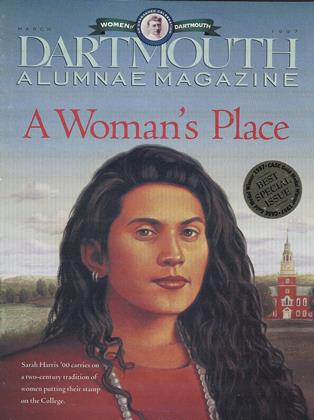How pertinent to each of us are interesting incidents in the lives of classmates which will be presented here as received. Please send yours along.
Bax Fullerton tells his experience as late '60s vice president, sales, of Warner & Swazey, large Cleveland machine tool builder, in the search for a new-concept computer-controlled metal turning machine.
"One afternoon," he writes, "I was doodling with an engineering department sketch of a flat, round indexing tool holder, designed to bring a succession of cutting tools to the workplace a conventional idea and noticed that if we would bring all of the tools out to the periphery of the device we cut in half the amount of cross travel required for machining a work piece. At 4:30 the next morning. I woke with the idea of elongating the device so that tools could be placed in different lateral positions to halve the lateral travel required.
"With no paper available, I pulled a shirt cardboard from the bureau drawer and sketched the idea on it. That morning I asked one of our engineers if he could design a machine using these concepts.
"He thought he could and out of that in the next few years came a line of several machines of all sizes representing two-thirds of Warner & Swazey business. A Japanese company copied our machine and were giving us fits on prices until we won, a patent shirt cardboard as exhibit one.
"I'm sure that the mind doesn't stop work while we are asleep! I know, also, that a liberal arts graduate who is one of the world's worst mechanics can contribute to a mechanical-type business."
Did you know that only George Washington, Winfield Scott, and U.S. Grant had the army rank of lieutenant general until World War II? After World War I, John J. Pershing was general of the armies for the rest of his life.
10570 Main St., B-401, Fairfax, VA 22030-7113; (703) 273-5456 (h); (703) 273-1127 (fax)
 View Full Issue
View Full Issue
More From This Issue
-
 Feature
FeatureA Sluggo's Sister Chooses Dartmouth
March 1997 By Gail Sullivan '82, T'87, and Robert Sullivan '75 -
 Feature
FeatureDartmouth HERSTORY
March 1997 -
 Feature
FeatureBeyond PARITY
March 1997 By Rebecca Bailey -
 Feature
FeatureKnowing Squat About the Woods
March 1997 By Heather Killebrew '89 -
 Feature
FeatureDartmouth's Most Influential Women Influential Women
March 1997 By Patricia E. Berry '81 -
 Feature
FeatureWhy Dartmouth is Better with Men
March 1997 By Jane Hodges
Barry Sullivan
Class Notes
-
 CLASS NOTES
CLASS NOTESDeaths
MARCH|APRIL 2019 -
 Class Notes
Class Notes1962
OCTOBER 1971 By ARTHUR W. HOOVER, JOHN T. SCHIFFMAN -
 Class Notes
Class NotesCLASS OF 1899
February, 1911 By Charles H. Donahue -
 Class Notes
Class Notes1951
April 1981 By HENRY NACHMAN JR. -
 Class Notes
Class NotesCLASS OF 1897
MAY 1930 By Morton C. Tuttle -
 Class Notes
Class Notes1960
JUNE 1966 By THOMAS R. MCBURNEY, WILLIAM G. BATT







